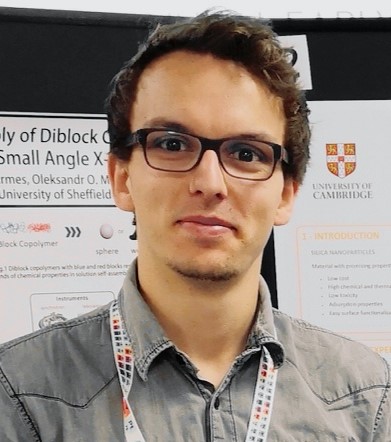STEM for Britain: pandemic edition
STEM for Britain is a poster competition for early career researchers held annually in Parliament. This year it was held online on 8 March, giving participants an opportunity to chat remotely with MPs about their research.
The winners in the chemistry category were Ben Lewis (Gold), Rachel Irlam (Silver) and David Brossault (Gold). We caught up with them about the experience.

Gold medal winner Ben Lewis Picture: © Ben Lewis
Ben Lewis, Imperial College London – Gold medal winner
Whilst, of course, it was a shame not to be able to be together in person in Westminster, it was fascinating to still be able to see the variety of work from the finalists across all the categories. There's such a huge amount of exciting science represented in this competition. It's a special part of this competition that we were challenged to best demonstrate that to as wide an audience as possible, and it was interesting to see how everyone tried to achieve this.
We've seen this year that decision-makers in government understanding the science can literally save lives. If we want our science to really matter, it's important those outside our research communities are able to hear about it and act on it. It was wonderful to see so many parliamentarians taking an interest in the competition.
It's an enormous honour to with the Gold Medal for Chemistry. I know from looking at all the posters that there's a lot of exceptional work being done, so for our work to be given this recognition feels amazing.

Silver medal winner Rachel Irlam Picture: © Rachel Irlam
Rachel Irlam, Newcastle University – Silver medal winner
I finished my PhD in September and then started a Postdoctoral Research Fellowship in October, at a new university and in a different field to the one I was working in. This was very challenging, particularly in the middle of a pandemic, since the people who would usually have been around to show me the ropes weren’t and it was a very steep learning curve. This is the first presentation that I have done of my postdoctoral research, so to have been awarded a medal for it, when I have often felt in the last few months that I’ve just been struggling along, feels incredible. I’m delighted to have had the opportunity to partake in the competition!
The STEM for Britain experience was a very exciting one; I’ve presented my research to people many times, but never to an audience of MPs! The nature of research means it can sometimes feel mundane and it’s disheartening when things don’t work, so it is easy to lose sight of the bigger picture. Taking my work out of the lab and into Parliament made me realise how important research really is for society and how big an impact it could have!

Bronze medal winner David Brossault Picture: © David Brossault
David Brossault, University of Cambridge – Bronze medal winner
STEM for Britain is a great opportunity for early-career academics to connect with politicians and share the importance of academic research to tackle current societal challenges. It was an honour for me to be shortlisted and be given the opportunity to present my PhD project during the Chemistry finals. I really enjoyed explaining to Members of Parliament how multifunctional microparticles could be produced using commercial nanoparticles as building blocks, and how such systems could be used for both biological (e.g. Bio-separation) and environmental (e.g. Water treatment) applications.
I was over the moon to discover a few days later that my project was awarded a Chemistry Bronze medal at this year's event. This award motivates me even more for the future, and I am now looking forward to optimizing further this approach before submitting my PhD thesis in the coming few months.